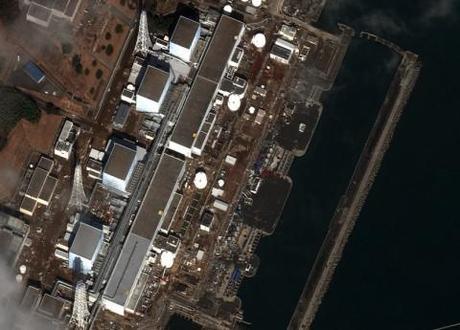
Satellite image showing damage at the Fukushima Dai-Ichi Nuclear Power plant. Photo credit: DigitalGlobe, www.digitalglobe.com
A meeting of Japanese officials to discuss reopening the country’s nuclear plants for the first time since last year’s Fukushima Daiichi nuclear disaster was interrupted by anti-nuclear protesters on Wednesday.
The meeting, closed to the public, was intended to review stress test results by Kansai Electric for two idle reactors in Fukui prefecture, which were found able to withstand an earthquake 1.8 times stronger than the maximum presumed quake for the region, as well as a tsunami wave up to 11.4 metres high. The Fukushima nuclear meltdown was the result of a devastating combination of the March 11, 2011 earthquake and tsunami; three of the plant’s reactors ultimately failed, releasing high levels of radiation into the surrounding air, soil and water, and quickly becoming the world’s worst nuclear disaster since Chernobyl.
An affirmative vote by the panel would only be the first step towards reopening the plants; they won’t be allowed to move forward until the Nuclear Safety Commission, another nuclear watchdog, reviews input from the International Atomic Energy Agency (IAEA) and Japanese experts, CNN reported. If the plants are not brought back on line by April, when the five operating reactors are taken off line for maintenance, Japan will have no nuclear power plants working.
But while scientists and government officials may be convinced that re-opening the country’s nuclear plants if a safe idea, others aren’t. Moreover, Japanese nuclear activists are angry at what appears to be the government’s intention to keep the public out of the decision.
A TV screen isn’t good enough. Given that Japan suffered the world’s worst nuclear disaster in 25 years last March, concern over the subject is understandable. According to The Times of India, the decision to show the meeting on a screen in a different room has raised questions over the impartiality of the panel; demonstrators demanded to be in the same room, arguing that the separation symbolised an intent to bring back nuclear plants without public input. CNN reported that one professor boycotted the discussion when he heard the public would be shut out.
Where’s the limit? Another cause of controversy is the revision of the recent announcement that nuclear reactors will be shut down after forty years; TIME accuses Japan of “backtracking” on plans made earlier this month by considering the possibility of allowing twenty year extensions. This would put the policy in line with the USA’s, and as ABC News pointed out, renewals have been granted to 66 out of 104 American nuclear reactors. With the 40 year rule, 36 of Japan’s 54 reactors would have to close by 2030. The governor of Shiga prefecture has voiced his worry that the 60-year limit will cause public unease.
Safety first. The proposed government bills would create an independent nuclear safety regulator and require safety assessments to be made public, but is this enough to calm the fears of the Japanese public? Experts have questioned the criteria of the safety tests, and argued that disasters often occur in a string of events so testing one is insufficient; there have been suggestions that the Fukushima plant had been damaged by the earthquake before the tsunami hit, such as those of The Economist blog Banyan.
“It is absolutely incredible,” said Junichi Sato, director of Greenpeace Japan. “This is an unacceptable risk for the people of Japan, especially when they are already suffering ongoing effects from the triple meltdown at Fukushima Daiichi.”
Local governments to the rescue… These issues have been recognised by some with the power to make a difference; the plans will need the green light from affected local governments, and Reuters has reported that Shinobu Tokioka, the mayor of Fukui’s Ohi town, wants “a comprehensive set of safety standards”. Their fears don’t seem to be shared across the globe; The Guardian‘s Damian Carrington on Wednesday revealed the return of British support for nuclear power after the Fukushima disaster.
“There will be no change in the fact that the number of reactors will decline, as will Japan’s reliance on them. But we’re not talking about the immediate future,” Chief Cabinet Secretary Osamu Fujimura said at a news conference.
A necessary evil? At the moment only five of the nation’s 54 reactors are online, as none have been restarted after routine safety tests since Fukushima. This has placed serious stress on other energy providers, increased the imports of fossil fuels and made a power use limit scheme necessary in Tokyo last summer. Nuclear power may not be intended as a long-term solution, but Asahi, the left-leaning daily national newspaper, has criticised the government for not decreasing its dependency on nuclear power fast enough. In an interview with The Financial Times, Japan’s Economy minister Yukio Edano called for consumer freedom and greater competition within the sector, blaming the monopolistic operating of companies such as Tokyo Electric Power for producing management failings.

